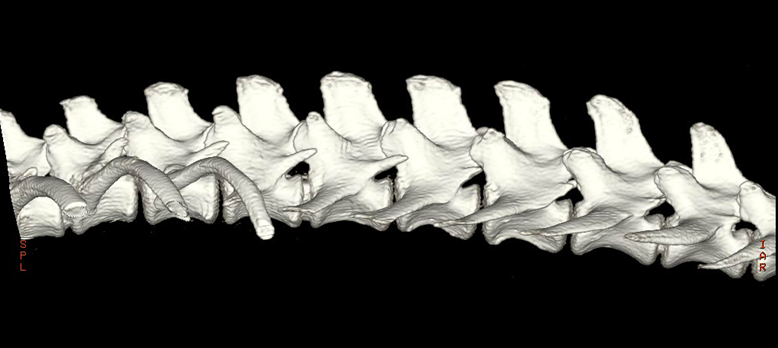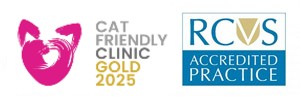
Background
It is very common for dogs to suddenly become partially or fully paralysed in the hindlegs because of a disc herniation in the middle of their back. It is especially common in small breed dogs with short legs. Many dogs that become paralysed in this way will recover without surgery - simply by being rested in a cage for days to weeks. However, some dogs continue to get worse and do not recover. For this reason, the current usual care for dogs that present with disc-associated paralysis is to undergo anaesthesia and MRI or CT scanning and then surgery to remove the herniated disc. However, these procedures are costly - even here at QVSH the cost of the usual care is currently at least £6000. Many owners cannot afford this and so their pets then have the only option of being treated conservatively - i.e. being placed in a confined space for up to 3-4 weeks while they (hopefully) recover. It is known that only a small proportion of dogs that become paralysed because of a herniated disc actually benefit from surgery but, unfortunately, we don’t know which ones these are when they present.
The purpose of this study is to test a less invasive procedure that, based on previous results, is likely to be helpful but would be much more affordable for owners (and less invasive – it is not a surgical procedure) for the dogs. The procedure has been previously used in both dogs (Takahashi T et al. Treatment of canine intervertebral disc displacement with chondroitinase ABC. Spine (Phila Pa 1976). 1997 Jul 1;22(13):1435-9; discussion 1446-7. doi: 10.1097/00007632-199707010-00002. PMID: 9231960) and humans (Muir E et al. Recent advances in the therapeutic uses of chondroitinase ABC. Exp Neurol. 2019 Nov;321:113032. doi: 10.1016/j.expneurol.2019.113032. Epub 2019 Aug 6. PMID: 31398353) and its potential efficacy and safety is not in doubt, but it has never been established as a routinely available therapy in UK.
The study
Dogs that will be recruited for inclusion in this study will be those chondrodystrophic dogs weighing less than 15kg (unfortunately we are unable to accept dogs at risk of brachycephalic obstructive airway syndrome such as French bulldogs due to increased aspiration risk), that present with an acute onset of partial or complete hindlimb paralysis and with an owner who cannot afford the standard price for usual treatment ie MRI and decompressive surgery. To be eligible for inclusion they must have become paralysed within 2 days of presentation and have a neurological exam which points to a thoracolumbar intervertebral disc extrusion. After obtaining informed owner consent, each dog will receive a full neurological examination and assessment to exclude other diseases or co-morbidities. Once stabilised, dogs will be administered sedation as routine and spinal needles will be placed into the intervertebral discs from which the extrusion can originate under fluoroscopic guidance. The study has received ethical approval from the University of Cambridge Dept of Veterinary Medicine ethics and welfare committee CR635.
Each dog will then be allowed to recover from sedation and receive standard analgaesics before being discharged to the owners' care. Follow-up will predominantly be via phone and email as is routine for conservatively-treated intervertebral disc cases. We will follow-up all cases for at least 4 weeks or until the dog regains the ability to walk again, whichever is longer.

Professor Paul Freeman, PI of the Cambridge IVDD Research group
If it is possible to show that intra-discal injection of Chondroitinase ABC is an effective therapy in acute thoracolumbar intervertebral disc herniation, it could provide a significantly lower cost treatment option for this condition for owners who are unable to afford advanced imaging and decompressive surgery. Furthermore, because of the fact that we will be treating 3-4 discs in each dog, there may be expected to be a significant reduction in recurrence rates in treated dogs, which would be a major benefit given that it is known that recurrence is expected in around 20% of affected dogs. Finally, if in the future this work is able to lead to proper trials of the effects of decompressive surgery versus non-surgical techniques, it may be possible to properly define which dogs really benefit from surgical treatment and which may be just as well treated in an alternative, lower cost and less invasive manner.
Information for owners
Owners will be asked to pay a fee of £400 inclusive of VAT to cover the costs of fluoroscopy, consumables, drugs and hospitalisation / nursing care. This fee must be paid on arrival to the hospital prior to admission.
Owners will be able to self refer through direct contact to the hospital neurology service, but referring vets / home veterinary practices will always be informed to ensure they are happy to comply with post injection requirements eg bladder management, ongoing analgaesia etc.
Please direct any questions or suggestions to Professor Paul Freeman, PI of the Cambridge IVDD Research group and Principal Clinical Neurologist at Queen’s Veterinary School Hospital, University of Cambridge: pf266@cam.ac.uk


